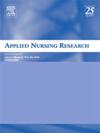Nurses/midwives safety attitudes and their relationship to individual factors (personality characteristics, length and clinical setting of experience): A quantitative study
IF 2.2
4区 医学
Q1 NURSING
引用次数: 0
Abstract
Background
Ensuring safe and effective delivery of patient care is currently under the spotlight worldwide. As the nursing and midwifery group holds the greatest proportion of global healthcare workforce, the need to minimise human error and promote patient safety is more demanding than ever. Existing literature is focusing on personality traits as a factor related to safety-related behaviours. Relevant findings could assist to the creation of processes/frameworks in education/training to minimise human error.
Objective
In this quantitative study, we aimed to investigate the relationship between safety attitudes and individual factors, specifically personality traits (extraversion; agreeableness; conscientiousness; neuroticism; openness), among nurses and midwives.
Design
We used a cross-sectional survey methodology.
Setting/participants
Nursing and midwifery professionals and university student participants (n = 380).
Results
We found that certain demographics (length of work experience and work settings) and personality traits (conscientiousness) were significantly associated with safety attitudes among nurses/midwives. Similarly, for student nurses/midwives, demographics (attended undergraduate program) and personality traits (agreeableness, openness, and neuroticism) were found to be linked to their reported safety attitudes.
Conclusion
Future safety educational/training programs in nursing and midwifery could be developed/amended to provide customized safety education/training to customized for individual personality traits’ needs. This proposed application could open new dimensions in safety within healthcare and especially nursing/midwifery.
护士/助产士安全态度及其与个体因素(人格特征、经验长度和临床环境)的关系:一项定量研究
目前,确保安全有效地提供患者护理是全世界关注的焦点。由于护理和助产组在全球医疗保健劳动力中所占比例最大,因此减少人为错误和促进患者安全的需求比以往任何时候都更加迫切。现有文献主要关注人格特征作为与安全相关行为相关的因素。相关的研究结果可以帮助在教育/培训中创建流程/框架,以尽量减少人为错误。目的通过定量研究,探讨安全态度与个体因素,特别是人格特质(外向性;随和性;责任心;神经质;开放性),在护士和助产士中。我们采用了横断面调查方法。环境/参与者:护理和助产专业人员和大学生参与者(n = 380)。结果我们发现某些人口统计数据(工作经验和工作环境的长度)和人格特征(责任心)与护士/助产士的安全态度显著相关。同样,对于学生护士/助产士来说,人口统计学(参加过本科课程)和人格特征(随和、开放和神经质)被发现与他们报告的安全态度有关。结论未来护理助产安全教育/培训方案可根据个体人格特征的需要,进行个性化的安全教育/培训。这个提议的应用程序可以在医疗保健,特别是护理/助产安全方面开辟新的维度。
本文章由计算机程序翻译,如有差异,请以英文原文为准。
求助全文
约1分钟内获得全文
求助全文
来源期刊

Applied Nursing Research
医学-护理
CiteScore
4.50
自引率
0.00%
发文量
65
审稿时长
70 days
期刊介绍:
Applied Nursing Research presents original, peer-reviewed research findings clearly and directly for clinical applications in all nursing specialties. Regular features include "Ask the Experts," research briefs, clinical methods, book reviews, news and announcements, and an editorial section. Applied Nursing Research covers such areas as pain management, patient education, discharge planning, nursing diagnosis, job stress in nursing, nursing influence on length of hospital stay, and nurse/physician collaboration.
 求助内容:
求助内容: 应助结果提醒方式:
应助结果提醒方式:


